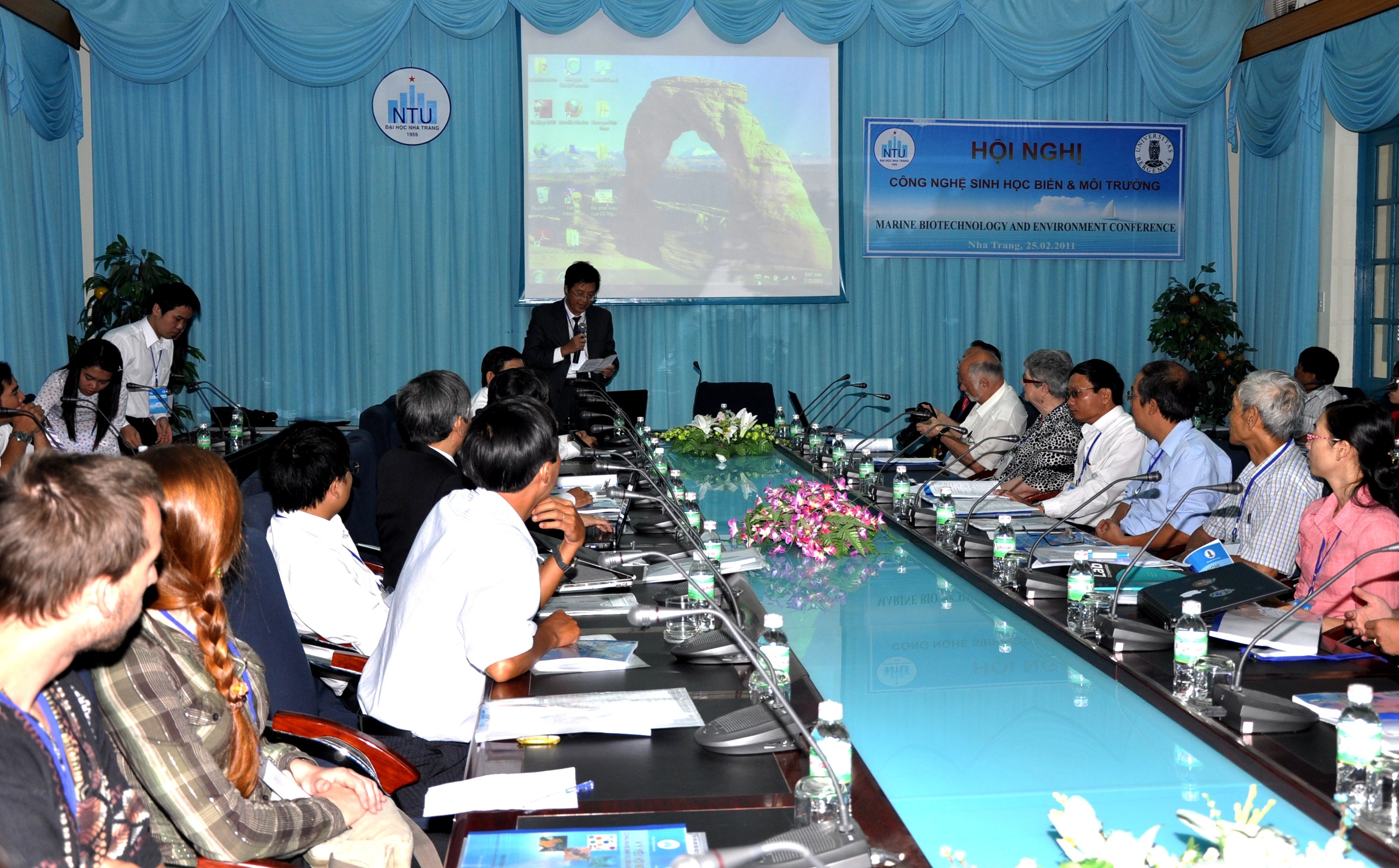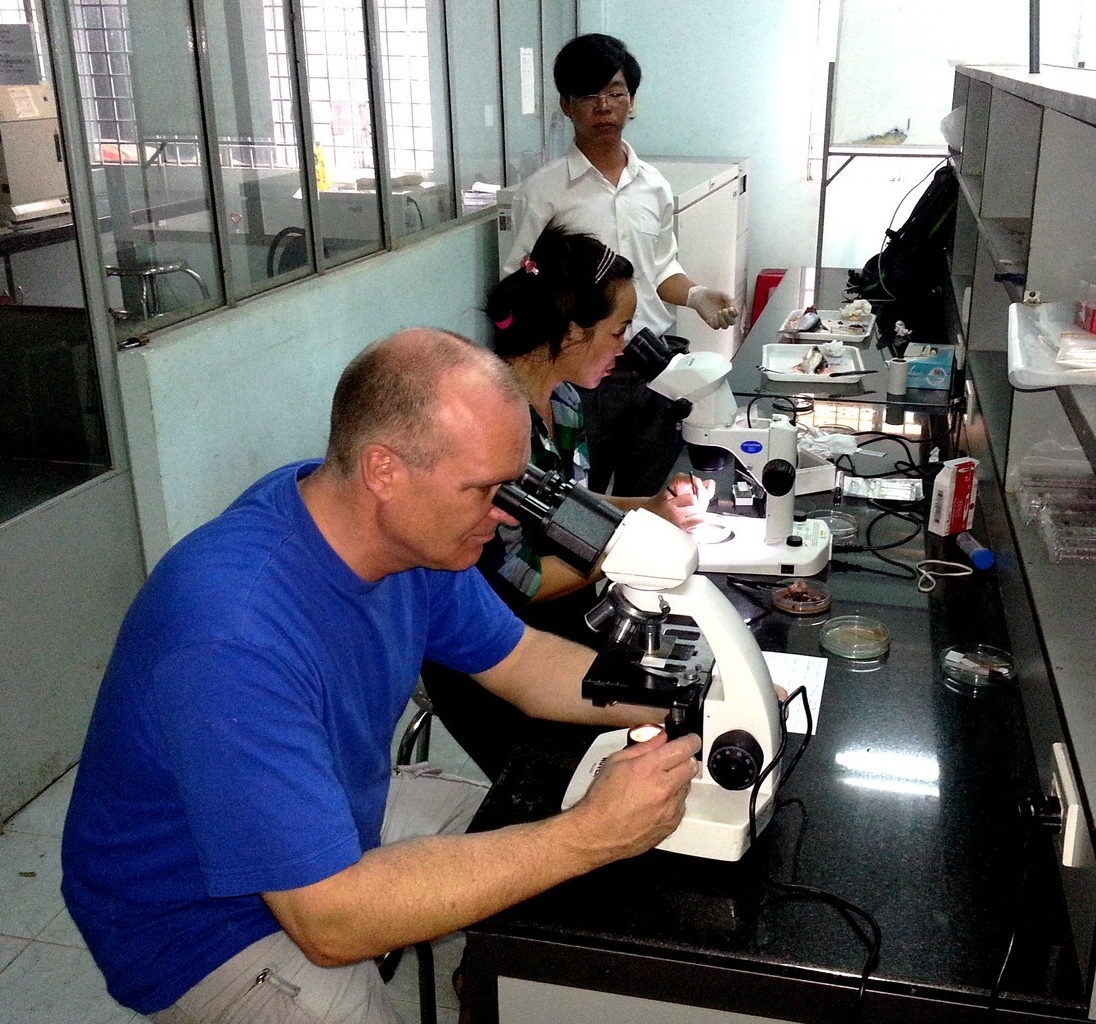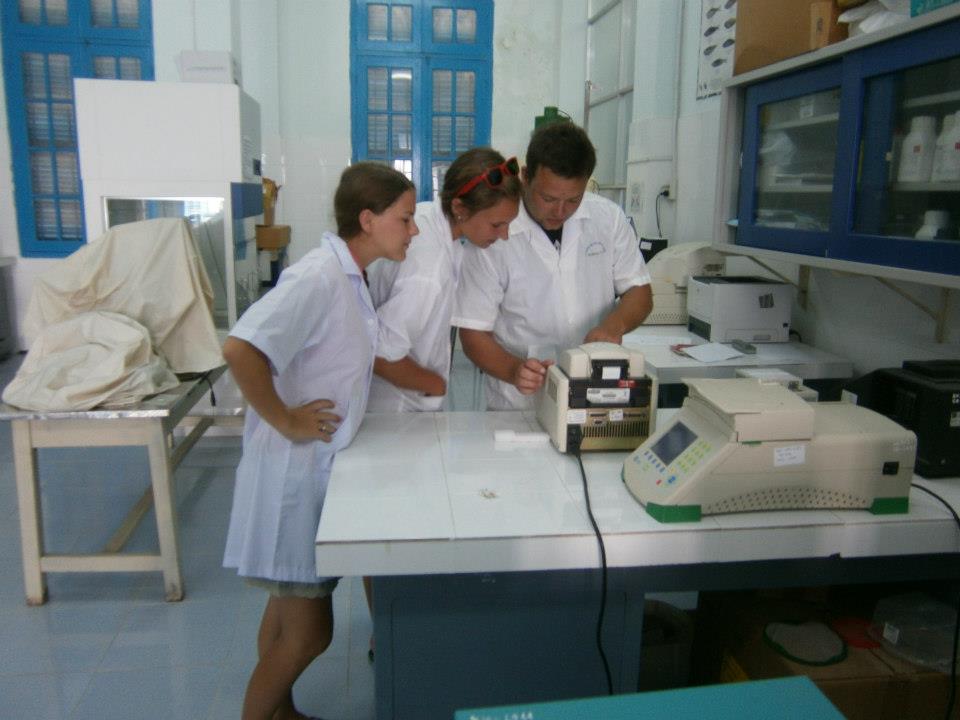INSTITUTE FOR BIOTECHNOLOGY AND ENVIRONMENT
| |
The Institute for Biotechnology and Environment emerged from former Central Laboratory (1992), the Laboratory of Biotechnology (1996), and the Center for Biotechnology and Environment (1999). In August 30, 2006 the Institute of Biotechnology and Environment was established by decision No. 634/QD-DHNT. The Institute now consists of three units: Department of Biotechnology, Department of Technology and Environmental Engineering, and Department of Research and Technology Development.
|

|
DEPARTMENTS
| |
Department of Biotechnology
The education program in biotechnology provides students with both advanced knowledge and specialized skills in biotechnology. It also equips students with the professional and soft skills to enable them to function either independently or in teams in the field of biotechnology including the application of biotechnology in food, cosmetics, agriculture, forestry, aquaculture and medicine.
In-depth studies have been implemented through scientific research and other projects at the national and international levels with a wide range of focuses, including probiotics, bacteriocin, biodiversity and marine conservation, biofuel, plant tissue culture, molecular diagnostics of fish diseases, marine microbiological testing, and micro-technology applications in the food and aquaculture industries.
|
|
Department of Environmental Engineering
| |
The Department of Environmental Engineering, Institute for Biotechnology and Environment, Nha Trang University was established under Decision No. 221/QD-DHNT dated March 6, 2008. The main task of the Department is to train engineers specializing in environmental engineering to have the knowledge, professional skills, political morals, ethics and professional behavior in order to achieve success in a career in environmental and social fields.
|
 |
|
| |
The main objective of the Environmental Engineering Department is to provide students with a foundation of knowledge and professional skills in environmental engineering technology to meet the evolving needs of the working environment.
|
|
| |
This includes developing a basis of knowledge in chemical-biological-treatment measures of environmental pollution and their applications in environmental technology. Students graduating from the Department of Environmental Engineering are fully qualified to perform environmental analysis and monitoring techniques, conduct environmental impact assessments, complete environmental pollution treatment systems design, perform consultations and implement a variety of practical environmental projects.
With these skills, graduates from this department can find employment at universities, research institutes and centers, environmental monitoring stations, or Environmental State Departments and Ministries.
|
|
| |
Department of Research and Technology Development
The Department of Research and Technology Development conducts scientific research on biotechnology and environment services and technology transfer. The department also provides students with practical experience using modern equipment in Biotechnology and Environment fields.
Previously, the Department operated under ISO 17025
- Received ISO 17025 certificate dated 26/6/2008. Today, the Department provides quality control activities that meet national and international standards
|
|
| |
STUDY PROGRAMS
Undergraduate programs:
1. Bachelor in Biotechnology
A Bachelor’s Degree of Biotechnology is a four-year, eight-semester, 130 credit hour program. The program provides students with a theoretical basis supplemented by practical work in the laboratory. Students joining the program will experience 120-week biotechnology training courses, which provide unmatched practical experience that will serve them in their future careers.
|
|
| |
The program includes requisite and elective courses in biochemistry, microbiology, molecular biology, molecular genetics, plant biotechnology, animal biotechnology and laboratory skills in biotechnological research. Other elective courses include environmental biology, conservation biology, and biodiversity. |
|
| |
2. Environmental Engineering
The Environmental Engineering program at NTU was designed to be a comprehensive environmental program. The program provides basic and advanced knowledge of relevant physical, chemical and biological systems with a strong emphasis on engineering. First and second year students are required to take basic courses in algebra, analysis, physics, chemistry, informatics, probability and statistics, ecology and social subjects. Third and fourth year students take basic engineering courses in fluid mechanics, environmental chemistry, environmental microbiology, toxicology, environmental economics, environmental management and other engineering-related subjects. Senior students (fourth year) are required to conduct an environmental engineering research project under the supervision of faculty members, prepare a thesis, and complete an oral defense of the thesis. The program requires 130 credit hours for graduation.
3. Exchange student program with Jan Evangelista Purkyně University in Ústí nad Labem (UJEP), Czech Republic.
|
|
 |
This course offers Czech and Vietnamese students basic and advanced knowledge in marine biodiversity in addition to environment and resource management. The program organizers also conduct many useful fieldtrips to the Marine Protected Areas, marine sea cages cultures and factories in Khanh Hoa and neighboring provinces. In addition, allowing Czech students to live on the lively campus at NTU gives them the unique opportunity to immerse themselves in Vietnamese culture. This cooperation has been carried out for two years, and NTU has thus far received four groups of students from UJEP.
|
|
| |
Short courses:
- Molecular diagnostic of aquatic disease
- Mushroom cultivation
RESEARCH
Research interest:
- Monitoring, consultancy, design and construction of environmental treatment systems.
- Diagnostic techniques in fisheries pathology.
- Biodiversity and genetic resources conservation of marine organism.
- Fixed living cells on biopolymer gel for the manufacture of biological products.
- Apply microbiological techniques in Aquaculture and food processing
- Encapsulation technique
- Tissue culture of plant
- Biofuel
|
|
| |
Achievements:
- Diagnostic technique for virus, bacteria and parasitic pathogens in shrimp and fish.
- Ex-situ conservation and of marine organism
- Data on the marine biodiversity (species richness and molecular phylogeny) and phylogeography of marine organism.
- Encapsulation of bitter gourd oil
- Probiotics for aquatic animal health
- Bacteriocins: Biology, Molecular Evolution and Applications
|
|
| |
Research groups
1. Biodiversity and Conservation led by Dr. Dang Thuy Binh. Its interests are:
- Marine Biodiversity
- Molecular phylogeny and phylogeography of marine organism
- Molecular Ecology and Evolution
- Genetic conservation |
|
| |
2. Climate change led by Dr. Dang Thuy Binh. Its objectives are:
- Climate change impact on marine biodiversity
- Conservation Genetics for Improved Biodiversity and Resource Management
3. Marine Biotechnology led by Dr. Nguyen Van Duy. Its interest is to develop marine drugs (bacteriocin, probiotics, etc.) from marine microbes for clinical, aquaculture, veterinary and food applications.
4. Biochemical and Microbial Technology led by Dr. Pham Thu Thuy. Its interests are:
- Microbiology and its application in aquaculture, food technology and environmental engineering;
- Biotechnological production and techniques applicable to biochemistry;
- Enzyme Technology
5. Extraction Technology of Bioactive Substances from Seafood Waste led by Assoc. Prof. Dr. Ngo Dang Nghia.
|
|
| |
CONTACT INFORMATION
Visiting address: Nha Trang Campus, 02 Nguyen Dinh Chieu, Nha Trang, Khanh Hoa, Vietnam
Mailing address: Nha Trang Campus, 02 Nguyen Dinh Chieu, Nha Trang, Khanh Hoa, Vietnam
Email: viencnshmt@yahoo.com.vn
Tel: +84.258.383 2075
Fax: +84.258.383 2075
Website: /viencnshdhnt/vi-vn/home.aspx
|
|
| |
LEADERSHIP
Director Mrs. Ngo Thi Hoai Duong, PhD.
Email: hoaiduong@ntu.edu.vn
Tel: +84.258.354 3853
Vice-Directors: Mrs. Dang Thuy Binh, PhD.
Email: binhdt@ntu.edu.vn
Tel: +84.90.413 5750
Mr. Nguyen Van Duy, PhD.
Email: duynv@ntu.edu.vn
Tel: +84.166.836 9837
|
|
|